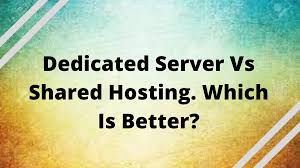
As your business grows, so do the demands on your hosting infrastructure. What starts as a simple site or app running on shared or VPS hosting can quickly outgrow its environment, especially when performance, security, or uptime become non-negotiable. For teams reaching this point, moving to a _dedicated server in Thailand_ can offer a powerful combination of control, reliability, and regional optimization.
A dedicated server means you lease an entire physical machine—not a slice of a machine, not virtual resources. Everything from CPU cores to RAM to bandwidth is allocated exclusively to your business. There’s no resource sharing, no noisy neighbors, and no throttling when another tenant spikes their traffic. You run your stack exactly the way you need to.
Why Businesses Graduate to Dedicated Servers
For most online ventures, the early phase of growth happens on shared or VPS plans. These environments work fine until you reach a threshold—maybe it’s consistent traffic above 100K users per month, a need to store large media files, or a custom backend that requires kernel-level configurations.
At that point, limitations begin to show. Shared hosting introduces latency. VPS nodes may not handle intense resource loads. Application errors occur more frequently. Worse, your provider may start enforcing usage caps or quietly throttling your resources.
A dedicated server removes those ceilings. You gain full root access, full hardware control, and the freedom to run specialized workloads: video processing, analytics dashboards, VPN services, staging environments, blockchain nodes, or SaaS applications requiring persistent database performance.
The Thailand Advantage
Hosting your dedicated server in Thailand offers geographic and operational benefits that global providers can’t easily match. If your audience or user base is based in Southeast Asia, hosting locally ensures significantly lower latency. It improves page load speeds, accelerates transaction processing, and creates a smoother experience across desktop and mobile.
It also gives you better alignment with Thai time zones, data routing paths, and support availability. When issues arise—or when scaling up requires urgent changes—you’re working with infrastructure that’s optimized for your region, not retrofitted for it.
This isn’t just about proximity. It’s about design. A server physically located in Bangkok is part of a network designed for ASEAN traffic, which results in fewer routing hops, less congestion, and more predictable uptime.
Who Needs a Dedicated Server?
Dedicated servers aren’t for everyone—but when they’re needed, there’s no substitute.
They’re the right fit for:
- SaaS platforms with growing user bases and 24/7 uptime requirements
- ECommerce companies processing high volumes of traffic and payments
- Agencies running multiple high-performance client environments
- Web3, fintech, or data analytics applications requiring full system access
- Businesses requiring predictable performance, strict compliance, or custom hardware configurations
A typical sign you’re ready for dedicated hosting is when your team starts optimizing backend processes, managing traffic spikes manually, or hitting storage and CPU ceilings regularly.
Choosing the Right Configuration
Not all dedicated servers are built the same. Some providers offer generic hardware with minimal flexibility, while others allow you to customize everything from CPU model to RAID setup. Choosing the right configuration starts with understanding what you’re running.
Do you need more cores or more RAM? Is fast disk access a priority, suggesting SSD or NVMe storage? Will your application benefit from dual CPUs, GPU support, or additional IP addresses?
Thai providers offering bare-metal servers often include setup tools that make it easier to scale gradually—starting with a mid-range box, then upgrading without reconfiguring from scratch.
You should also check for included features like OS reinstallation, remote reboot access, and hardware monitoring tools. These features reduce your dependency on support and give you real operational autonomy.
Dedicated Servers and Compliance
Hosting sensitive or regulated data—such as financial records, customer databases, or internal communications—often requires more than just a privacy policy. Some industries need full control over physical access to servers, secure audit logs, and data that doesn’t cross borders.
By hosting your infrastructure on a dedicated machine in Thailand, you gain a clearer compliance posture. Your data remains within national jurisdiction. You can document access protocols, limit external dependencies, and respond to client or vendor questions about data handling with precision.
For businesses serving enterprise clients, this level of control can be a key differentiator. It builds trust and ensures you're positioned to handle regulatory changes down the line.
Local Support for Critical Operations
Perhaps the most overlooked benefit of a Thai-based dedicated server is the support that comes with it. Working in the same timezone as your hosting provider makes a huge difference during outages, security audits, or urgent configuration changes.
Rather than waiting for a response from a ticketing system half a world away, local teams can escalate issues quickly, access technicians who understand regional conditions, and resolve problems without delay. That responsiveness is critical for businesses where downtime has real cost—lost revenue, broken integrations, or compliance risks.